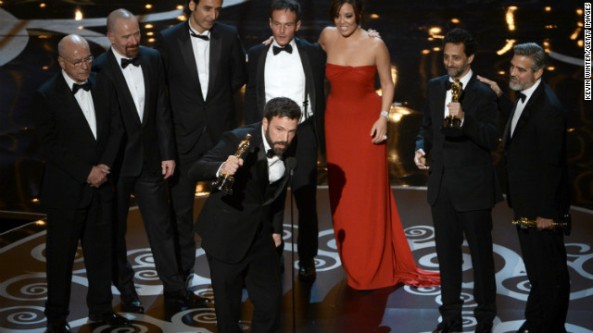“Argo’s” images of people rioting in Iranian streets look startlingly similar to the ones we see coming out of the Middle East today. The fact that this movie’s opening scene is an attack on an American embassy gives it an even more disturbing modern day resonance.
Ben Affleck’s film speaks to the power of images and the strength of Hollywood movies to impact the culture around the world.
Thankfully, “Argo” is exactly the arresting genre picture a movie about movie making (even fake movie making) deserves. It’s a multi-layered thriller laced in Hollywood bravura and whip smart cynicism, and it does this remarkably true story proud by letting its heroes and storytelling shine.
“Argo” is based on a recently declassified CIA mission from 1979 to 1980 in which six American diplomats hiding out in the Canadian embassy were snuck out of Iran during a several month long American hostage crisis. The plan to make their escape was organized by Tony Mendez (Affleck), who admits that this was the best bad idea they had. That’s because it does move into that ever-so-common movie territory of “too good to be true.”
We’ll set up alibis for the six Americans as a Canadian film crew making a science fiction movie named Argo. The script is a sprawling “Star Wars” ripoff set in an exotic location, and Iran just might be the perfect place to shoot. We’ll sell ad space in Variety, attach producers and make this fake movie a fake hit.
Well there’s your movie right there.
Affleck takes this farfetched story that would only be good enough for movie magic and makes it a true-to-life reality. It’s an accurate account of how Mendez enlisted help from an Oscar winning make up artist, John Chambers (John Goodman), got a curmudgeonly producer, Lester Siegel (Alan Arkin), and established an elaborate cover story.
What makes “Argo” such delicious catnip to movie lovers is its strong insider mentality. Every idea brainstormed is a hopelessly bad one, no one has any faith in the plan or even this movie that actual Hollywood execs think to be real, and yet the movie magic pluck that the good guys will make it in the end always seems to win out.
It does so in the last minute chases at the Iranian airport or the cynical sparring battle between Arkin and a producer over what project he’s going to finance next, and it happens when two Iranian border agents are struck silly by storyboards for even the idea of this fake movie.
And yet Affleck acknowledges that the movies only work because of their images, not their words. So much of his story is told through TV screens and archive footage, and the rest is captured in grippingly immersive suspense scenes often free of score or even much dialogue.
His subtle way of explaining how much images matter come when an American protester quotes “Network” in saying he’s mad as hell, or when the Canadian ambassador Ken Taylor (Victor Garber) says to Mendez, “I expected more of a G-Man look.”
These are moments and ideas that come from the movies, and in this way “Argo” is a powerful zeitgeist movie that is set in the early ‘80s but can resonate in our modern, media driven world.
3 ½ stars
